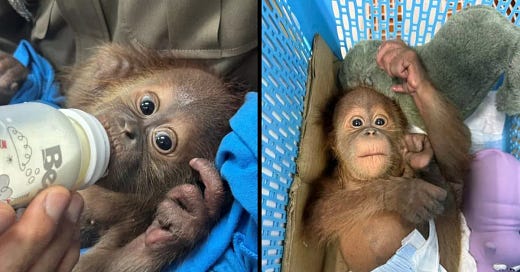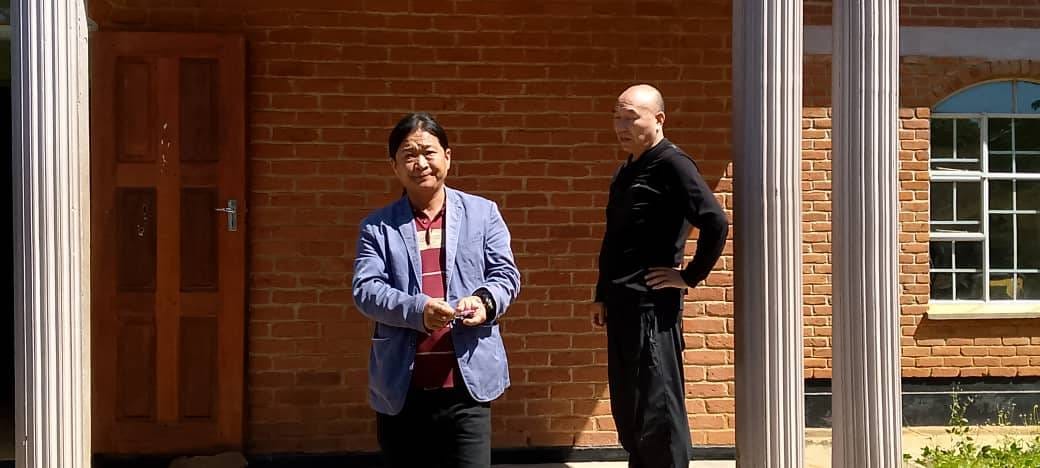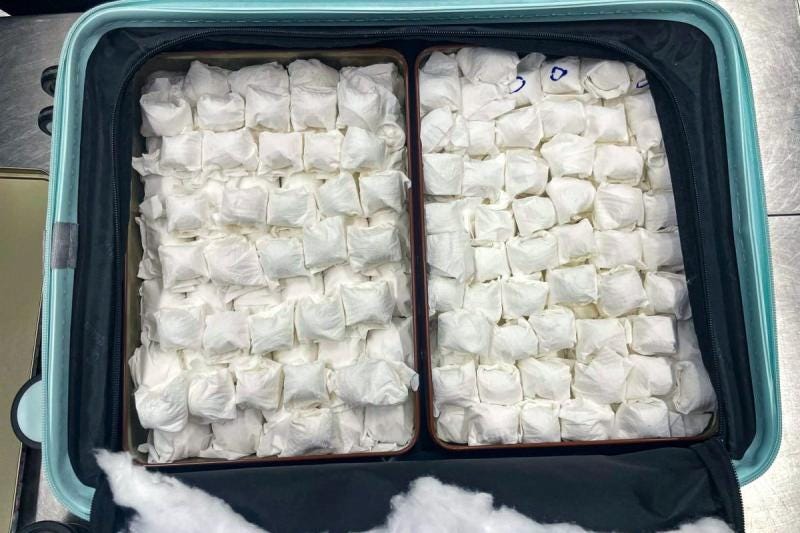The Wild Crime Report for Monday 19 May 2025
Orangutans rescued in Bangkok, order restored in Malawi and bird business.
Welcome to the Wild Crime Report. Like a short burst of coffee to give you that hit of all things wildlife and crime that is going on around the world.
I had some interesting discussions with people about last week’s story on the Malawi legal cases surrounding the Chinese national (more on that down below) which made me consider that a longer piece on wildlife justice and more specifically, wildlife prosecutions is worth discussing.
Now let’s get into some information.
Baby orangutans saved in a Bangkok bust
I’ve always had a soft spot for orangutans. I mean it makes sense, considering we share about 97% of DNA with them. When you see one of them it’s a lot like watching a little hairy, orange person and should warm even the coldest of hearts. Which is why it was very relieving and simultaneously disturbing to see wildlife investigators save two baby orangutans in a police sting operation in Bangkok last week.
The Royal Thai Police managed to arrest a courier, identified as 47 year old Thai national Tannasit Chotraweeamornchai at a gas station while he was attempting to deliver the babies. The operation had considerable resources with support coming from the United States Fish and Wildlife Service and the Wildlife Justice Commission.
As one of the most endangered but highly sought after species in South East Asia, orangutans are constantly under threat from both the demand of international buyers for exotic pets and also the habitat shrinkage in their native lands of Sumatra and Borneo, which can expose the species to poachers. This isn’t the first time that orangutans have been seized across Asia, with past cases also involving the attempting smuggling of infants. Unfortunately the market is usually drawn towards babies that can be raised in captivity by their own, a fate that is often met with the reality that they were taken from their mother either illegally from a captive breeding centre or by force from the wild.
The two orangutans were named Christopher and Stefan, with the former being taken to a sanctuary while the latter (who was only 1 month old) receiving continued medical attention.
Wildlife kingpin in Malawi remains behind bars
As led in last week’s report, the uproar in Malawi that was spilling into court regarding convicted wildlife trafficker Lin Yun Hua’s supposed pardon, was ended last week when a judge ordered Lin to remain bail refused on new charges. Kind of makes sense that he doesn’t get bail, given he’s still serving a 14 year sentence!
Lin has been charged for corruption offences under Malawi’s Corrupt Practices Act 1996 for allegedly giving money to the former head of the prison for unsanctioned releases to his home residence. And also attempting to bribe the presiding judge in his wildlife trial.
Sounds like someone’s been reading too many books about Pablo Escobar.
Peacock feather bust in Manipur State
As they say one minute you’re the cock of the walk, the next, you’re a feather duster. And one young man in Manipur State, India had a whole car load of them. The suspect in question, Mr Sharifuddin, was stopped last week at a checkpoint on the way to neighbouring Myanmar with a whopping 72,000 peacock feather shafts weighing 142 kilograms.
Having been to India and seeing the magnificent peacocks that literally peacock around estates and gardens, it comes as no surprise that there is a market for them and people willing to capitalise on it by collecting and harvesting the colourful creatures. Fortunately, Indian wildlife enforcement being what it is, is only too ready to jump on would be smugglers and clean them up. (Sorry)
Birds stopped at the border
Why did the chickens cross the border? And why were they accompanied by 16 parakeets? Answers to that would be joke are welcome in the comments section below.
However, this collection of birds was announced last week as being found earlier in the month by US Customs and Border Protection at San Diego. Along with another separate case of a 51 year old man attempting to smuggle a dozen parrots, six of which were concealed within his pants. Of course they were.
The smuggling of the birds such as the chickens is contrary to US laws protecting biodiversity and protecting the emergence of animal diseases, however the parrots (species not named) may be protected under more stronger legislation such as the Lacey Act as indicated by the fact that CBP turned the investigations over to US Fish and Wildlife.
Significant sentence imposed in Hong Kong for parrot smuggler
And just to round things out with another bird busting case, the pointy end of proceedings went down in Hong Kong last week and saw a Thai national sentenced to 24 months imprisonment after attempting to smuggle 188 assorted parrot eggs.
The unnamed smuggler was caught by officers from the Agriculture, Fisheries and Conservation Department (AFCD) just over a year ago in March 2024. Forensic testing found the eggs to belong to a variety of parrot species such as the Moluccan cockatoo and African Grey Parrot (both CITES Appendix I species) as well as a range of parrots from South America and Australia, all similarly protected by CITES regulations.
I would argue, of course without knowing all the facts, that this sentence seems about right. Certainly no slap on the wrist and a prison term that ought to deter other would be bird smugglers. It’s encouraging to see Hong Kong’s recently improved wildlife sentences due to wildlife crime being included in the Organised and Serious Crime Ordinance.
Stay wild.








